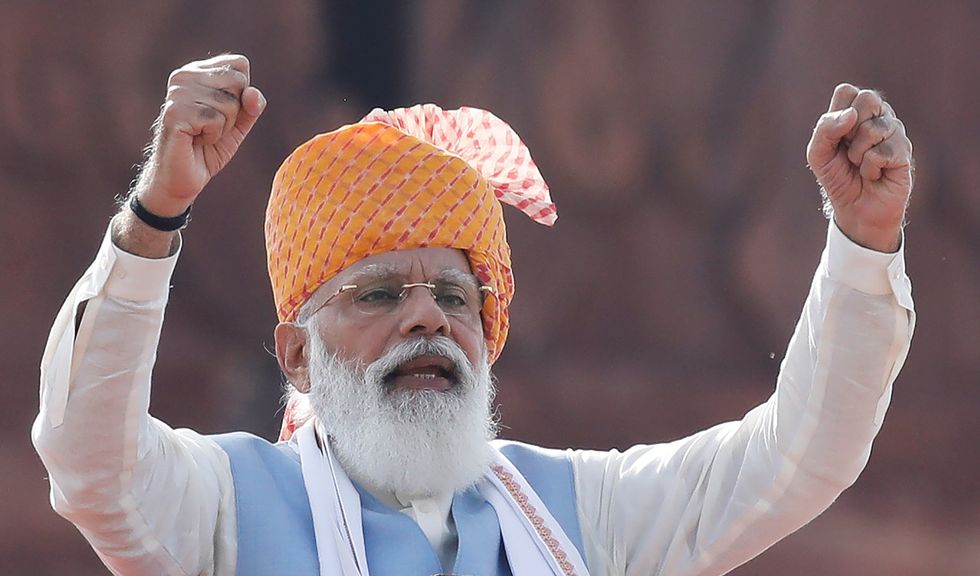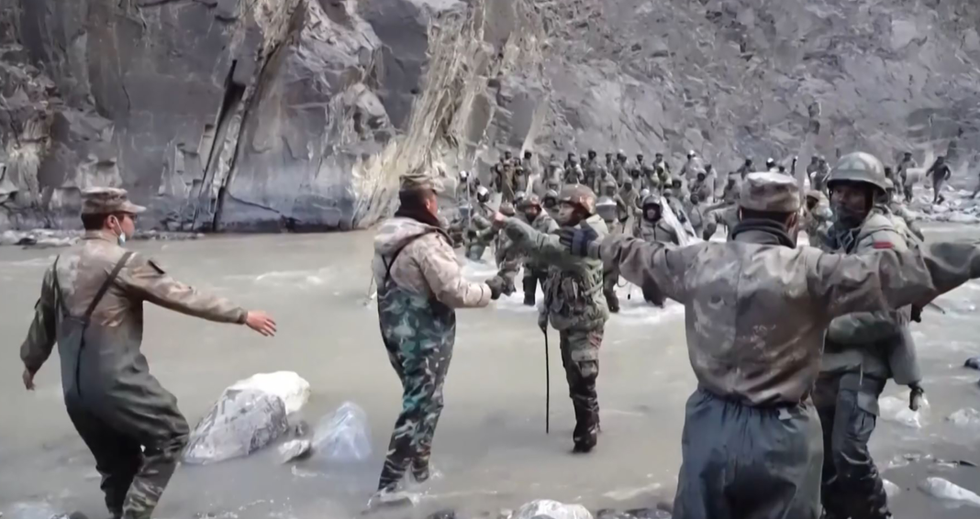THE new security treaty, signed last week by the US, the UK and Australia and aimed at confronting the menace of China’s growing naval fleet in the Indo-Pacific region, is a “welcome development” for India, influential political, foreign policy and defence experts have told Eastern Eye.
AUKUS, an acronym denoting the three participants, was announced last Thursday (16) in a joint video conference by US president Joe Biden, and the prime ministers of the UK and Australia respectively, Boris Johnson and Scott Morrison.
It will allow Australian nuclear-powered submarines – they will not be equipped with nuclear weapons – to offer a more credible challenge to China’s perceived aggression.
“AUKUS is a welcome development for India in three ways,” said Rahul Roy-Chaudhury, senior fellow for south Asia at the International Institute for Strategic Studies (IISS) in London.
“It represents a significant shift in US and UK foreign policy towards the Indo-Pacific region; signals a renewed commitment and credibility to the region by US and UK armed forces that is being questioned after their disastrous withdrawal and botched evacuation from Kabul airport; and represents substantive defence capability cooperation among the three countries,” he said.

Tom Tugendhat, chairman of the Commons Foreign Affairs Select Committee since 2017 and regarded a big hitter on international relations, especially on India-China tensions, told Eastern Eye: “Having partners capable of defending themselves and their allies matters to us all. With the creation of AUKUS, India now has another ally with the capability to project force undersea. That’s good for India, and good for democracies around the world.”
No one is surprised that China has condemned the agreement as “extremely irresponsible”. France, too, is furious, but for a different reason. The agreement spells the end for a $90 billion (£66bn) contract Australia signed with the French company Naval Group in 2016 to build 12 conventional submarines.
It marks a setback for president Emmanuel Macron, who has recalled France’s ambassadors from the US and Australia.
India will not want to further aggravate relations with China, after their soldiers were involved in violent exchanges in the Himalayan border area last year. India regrets France was excluded from the deal.
Nevertheless, Shashank Joshi, defence editor of The Economist, insists: “In many ways, AUKUS is a win-win development for India. The prospect of a better armed Australia and greater American and British involvement in the Indo-Pacific is good news for Delhi, because it puts China under greater pressure. But the French anger is also helpful: it makes it more likely that Paris will put more effort into the Franco-Indian relationship, and perhaps also the France-India-Japan trilateral.
“India is already buying French Rafale warplanes and Scorpene submarines. Its hope will be that France may deal with India on more generous terms in order to counter US and UK influence.”
India is part of the Quadrilateral Security Dialogue (also known as the Quad), a strategic dialogue between the US, India, Japan and Australia that is maintained by talks between member countries.
It was due to meet on Friday (24), with Biden hosting the Indian prime minister Narendra Modi, his Japanese counterpart, Yoshihide Suga, and Australia’s Morrison.

According to the White House, the Quad leaders will focus on issues related to the Covid-19 crisis, climate change, cyberspace and security in the Indo-Pacific.
Rana Mitter, professor of the history and politics of modern China at Oxford University, said: “AUKUS shows the capacity of actors in the Indo-Pacific not to enter a new Cold War, as China has described it, but rather to construct a series of mini-deals, each addressing a different facet of the liberal order.
“India’s presence in the Quad is one part of that, alongside Australia, Japan and the UK. AUKUS is another example of how it can be done. But it’s hard to avoid the reality that for India, the US, Australia and other actors, the key driver is still working out how to deal with Chinese power in the region.”
For the BBC’s former south Asia specialist, Humphrey Hawksley, life is almost imitating his books. He has imagined real wars in the region in such books as Asian Waters: The Struggle Over the Indo-Pacific and The Challenge to American Power, and Dragon Fire: The realistic and Gripping Novel of the Next War.
Hawksley, the BBC’s former BBC Beijing bureau chief, said: “As the Sino-Western rivalry intensifies, India is moving into the position it found itself between 1962, when the US unequivocally supported Delhi in the China war, and 1971, when the US supported Pakistan in the Bangladesh war of independence. India then signed its pact with Moscow which endures today.”
Hawksley believes that “the AUKUS deal is yet more evidence that the US views the QUAD in itself as not enough to counter China. The long-term reliability of India and, possibly, Japan, is questionable. As an Asian nation, India needs to forge its own relationship with China, far removed from the dictates of Washington. Therefore, some years down the road, it is not inconceivable that, as in 1971, India will be viewed by Washington as a hostile state because it has become too close to China.”
Detailed analysis is offered by RoyChaudhury, who said: “AUKUS represents two of India’s closest strategic partners – the US and Australia – and a prospective ‘comprehensive strategic partner’, the US; although there will be some disappointment in New Delhi that France, India’s strongest defence partner in Europe, has been ‘snubbed’.
“Nonetheless, cooperation among the ‘Quad’ grouping of India, the US, Australia and Japan is simultaneously being ‘ramped up’ through the first ‘face-to-face leaders’ summit in Washington, following prime minister Modi’s scheduled visit to New York to address the UN General Assembly.”
Roy-Chaudhury set out the background: “The central, although unstated, rationale for AUKUS is China’s assertiveness towards countries in the South China Sea and the Indo-Pacific, including India. Whereas US apprehensions towards China have been clear for some time, with Australian concerns made public more recently, AUKUS represents the UK’s first substantive defence pact in the Indo-Pacific region after the publication of its post-Brexit Integrated Review and Defence Command Paper in March 2021.
“Although India was identified as a ‘key pillar’ for the UK in the Indo-Pacific region, and China described as the ‘biggest state-based threat’ to the UK’s economic security, the UK had also sought to engage China at multiple levels, including on economic and climate change issues. The latter had raised suspicion within India’s powerful security establishment of the UK’s ‘intent’ towards China.”
He added: “AUKUS will now represent a significant step in assuaging New Delhi’s perceptions, essential if the new defence and security component of the India-UK Roadmap to 2030, released by both prime ministers virtually on May 4, 2021, is to be implemented. The new UK foreign secretary, Liz Truss, well known and respected by India’s ministerial and trade officials, will now lead on implementing this roadmap.”
Roy-Chaudhury said: “Although India will not seek to join AUKUS, nor will it be invited to do so, it nonetheless represents a significant opportunity to deepen bilateral defence and security ties with the UK, including through ‘Quad +1’ arrangements.
“For precisely the same reasons that India would welcome AUKUS, China has strongly condemned it. China criticised the trilateral security pact as ‘severely damaging regional peace’, accusing the three countries of having a ‘Cold War mentality’ and warned of an arms race for nuclear submarines. In order not to unnecessarily provoke China diplomatically, India will likely welcome AUKUS privately, but not publicly.”
He added: “The violent clashes between Indian and Chinese troops in the Galwan valley on June 15, 2020, resulting in the deaths of 20 Indian soldiers – the first fatalities on the Line of Actual Control (LAC) in 45 years – marked a turning point in India’s ties with China. Till then, the trade relationship with China, as India’s largest or second-largest trading partner, had taken primacy or perceived in parallel with India’s security concerns.
“Now, security considerations over China have been elevated. Although India’s punitive response to the Galwan clashes were relatively minor on the trade and social media fronts, this resulted in an accelerated build-up of India’s military and defence-related infrastructure in the border regions.
“In an attempt to counter Chinese assertiveness, India also bolstered its bilateral security ties with the US, actively reached out to European partners ‘tilting’ to the Indo-Pacific and carried out, for the first time in over a decade, a ‘Quad’ naval exercise in late 2020 with the inclusion of the Australian navy.”
Roy-Chaudhury concluded: “India also conducts occasional joint bilateral naval exercises with the Philippines, Singapore and Vietnam in the South China Sea, an area of aggressive Chinese policy in relation to its vast disputed territorial claims and counter-claims that has alarmed its maritime neighbours.
Rather than a quest for resources such as oil, this apparently has more to do with China’s expansion of power, based on traditionally high economic growth and continuing military modernisation, alongside rising domestic nationalism vis-v-vis the US and the ascendance of president Xi Jinping.
US rules out adding India or Japan
The US has ruled out adding India or Japan to the trilateral security alliance, AUKUS.
"The announcement of AUKUS last week was not meant to be an indication, and I think this is the message the president also sent to (French president Emmanuel) Macron, that there is no one else who will be involved in security in the Indo-Pacific," White House press secretary Jen Psaki told reporters.
Psaki was responding to a question if countries like India and Japan whose leaders would be in Washington this week for the first in-person Quad Summit would be made part of the new security alliance.
The AUKUS is seen as an effort to counter China in the Indo-Pacific. But the move angered France, a European ally of the US, which said it had been "stabbed in the back" and has publicly expressed its outrage.
It recalled its ambassador to the US and Australia. Meanwhile, in a bid to mend ties, president Biden and his French counterpart Emmanuel Macron agreed on Wednesday (22) that the “open consultations” among allies on matters of strategic interest to France would have helped in having a better situation.



















